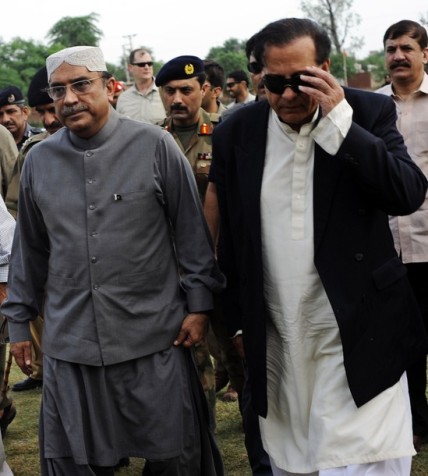
FILE : In this picture dated on August 19, 2010 Pakistani President Asif Ali Zardari (L) walks with Pakistani Punjab governor Salman Taseer in Jampur. On January 4, 2011 Pakistan's governor of Punjab was shot dead near his Islamabad home in a political assassination that threatens to sink the nuclear-armed country ever deeper into chaos. (Photo by FAROOQ NAEEM/AFP/Getty Images)
Please also visit : KATAKAMI.COM
January 05, 2011 (KATAKAMI / ABC NEWS) ) — When he got to work this morning, police officer Mumtaz Qadri asked to be assigned to theGovernor of Punjab‘s security detail. Qadri was a member of Punjab’s elite police force, he had guarded the Governor before, and he got the assignment he was looking for.
As Governor Salman Taseer made a morning visit to the popular and upscale Khosar Market in the capital, Islamabad, Qadri was the lead security guard. The governor had a meal at one of the market’s restaurants, and was getting into his car when Mumtaz Qadri turned and opened fire, at close range, on the man he was supposed to have been protecting.
Salman Taseer died almost instantly. Hospital officials say they found nine bullets in the Governor’s corpse.
The attack would have been a tragic and compelling story anywhere — but the dateline and motive for the killing could mean grave trouble for Pakistan, for moderation, and for the United States.
Secretary of State Hilary Clinton today called his death “a great loss.” In a statement she said, “I had the opportunity to meet Governor Taseer in Pakistan and I admired his work to promote tolerance and the education of Pakistan’s future generations.”
The United States remains committed to helping the government and people of Pakistan as they persevere in their campaign to bring peace and stability to their country.
Salman Taseer was Governor of Pakistan’s most important province, a bold and controversial politician, and a voice for moderation in an increasingly militant and anti-American nation. Taseer was a senior leader of the late Benazir Bhutto’s Pakistan People’s Party, and it appears he met the same fate as Ms. Bhutto for some of the same reasons.
Today’s killing, as ABC’s Nick Schifrin put it, “isn’t just a terrorist act or a political assassination. It is a violent proclamation by Pakistani radicals that they will kill anyone who argues Pakistan should become a more secular, progressive state.”
Gov. Taseer and his family lived a Western lifestyle, and he recently advocated changing Pakistan’s blasphemy laws, which call for a mandatory death sentence for anyone convicted of insulting Islam.
Today Qadri, Taseer’s killer, told police he had decided on the assassination three days ago, and was proud to have killed “a blasphemer,” according to investigators.
Some reports suggest that his fellow bodyguards congratulated the killer; others say none of the others raised a finger while the bullets flew. The other guards have all been taken into custody for questioning.
The focus of that questioning, no doubt, will be the possibility that radicals have infiltrated Pakistan’s security services. The killer was a trained commando — an elite officer. If he was able to get himself inside the commandos, there’s a fear that radicals can infect all levels of the police and, to a lesser extent, the Pakistani army.
The supposedly liberal and secularPakistan People’s Party — which President Zardari leads and Taseerbelonged to — had already cowed to religious parties’ requests and promised not to touch the blasphemy laws. Taseer’s death can therefore be seen as an even more brazen and appalling statement by the radicals that they will go to any extremes against a more secular, liberal, society.
The site of the assassination underscores the point: Khosar Market is associated strongly with Westerners and elite Pakistanis who enjoy Starbucks-style coffee shops. It’s as Western as it gets in Islamabad.
Finally, and perhaps most worrisome of all for the U.S., Governor Taseer’s killing comes as the government is fighting for its survival after two parties withdrew from the coalition.
Just today the main opposition party gave the government three days to present policy fixes for the nation — or face a no-confidence move in the parliament. Ironically, the assassination has provided the government a little breathing room; that three-day ultimatum has been postponed, until the 40-day mourning period for Governor Taseer is over.
For now, one of the United States’ most crucial allies — already plagued by corruption, grave economic problems and a powerful insurgency — must face the prospect of serious and long-term instability. And the possibility that moderation in Pakistan — in short supply already — may have been among the assassin’s victims. (*)